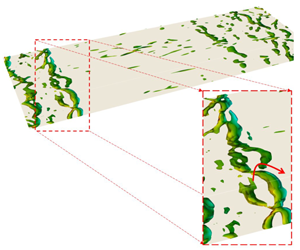Article contents
Acoustic streaming in turbulent compressible channel flow for heat transfer enhancement
Published online by Cambridge University Press: 18 February 2020
Abstract

Acoustic streaming in high-speed compressible channel flow and its impact on heat and momentum transfer is analysed numerically at two different Mach numbers,  $M_{b}=0.75$ and 1.5, and moderate Reynolds numbers,
$M_{b}=0.75$ and 1.5, and moderate Reynolds numbers,  $Re_{b}=3000$ and 6000. An external time-periodic forcing function is implemented to model the effect of acoustic drivers placed on the sidewalls. The excitation frequency is chosen according to the linear stability analysis of the background (unexcited) flow. High-fidelity numerical simulations performed at the optimal resonant condition reveal an initially exponential growth of perturbations followed by a nonlinear regime leading to the limit-cycle oscillations. In the last stage, we observe an acoustic (steady) streaming appearing as a result of nonlinear interactions between the periodic external wave and the background flow. This causes a steady enhancement in heat transfer at a rate higher than the skin-friction augmentation. We also show that perturbations of similar amplitude, but at suboptimal frequencies, may not lead to such limit-cycle oscillations and cannot make any noticeable modifications to the time-averaged flow quantities. The present research is the first study to demonstrate the acoustic streaming in compressible turbulent flows, and it introduces a novel technique towards enhancing the heat transfer with minimal skin-friction production.
$Re_{b}=3000$ and 6000. An external time-periodic forcing function is implemented to model the effect of acoustic drivers placed on the sidewalls. The excitation frequency is chosen according to the linear stability analysis of the background (unexcited) flow. High-fidelity numerical simulations performed at the optimal resonant condition reveal an initially exponential growth of perturbations followed by a nonlinear regime leading to the limit-cycle oscillations. In the last stage, we observe an acoustic (steady) streaming appearing as a result of nonlinear interactions between the periodic external wave and the background flow. This causes a steady enhancement in heat transfer at a rate higher than the skin-friction augmentation. We also show that perturbations of similar amplitude, but at suboptimal frequencies, may not lead to such limit-cycle oscillations and cannot make any noticeable modifications to the time-averaged flow quantities. The present research is the first study to demonstrate the acoustic streaming in compressible turbulent flows, and it introduces a novel technique towards enhancing the heat transfer with minimal skin-friction production.
- Type
- JFM Papers
- Information
- Copyright
- © The Author(s), 2020. Published by Cambridge University Press
References
- 9
- Cited by


